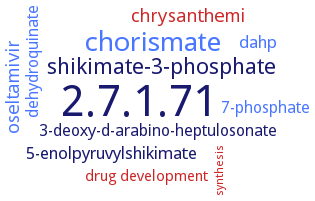2.7.1.71: shikimate kinase
This is an abbreviated version!
For detailed information about shikimate kinase, go to the full flat file.

Word Map on EC 2.7.1.71 
-
2.7.1.71
-
chorismate
-
shikimate-3-phosphate
-
chrysanthemi
-
oseltamivir
-
dahp
-
5-enolpyruvylshikimate
-
3-deoxy-d-arabino-heptulosonate
-
dehydroquinate
-
7-phosphate
-
drug development
-
synthesis
- 2.7.1.71
- chorismate
-
shikimate-3-phosphate
- chrysanthemi
- oseltamivir
- dahp
-
5-enolpyruvylshikimate
-
3-deoxy-d-arabino-heptulosonate
- dehydroquinate
- 7-phosphate
- drug development
- synthesis
Reaction
Synonyms
adenosine triphosphate: shikimate-3-phosphotransferase, AroK, AroL, AtSK1, AtSK2, kinase (phosphorylating), shikimate, kinase, shikimate (phosphorylating), MtSK, OsSK1, OsSK2, OsSK3, Rv2539c, shikimate kinase II, shikimate kinase-like 1, SK I, SK II, SK1, SK2, SKI, SKII, SKL1, type I shikimate kinase, aroK-encoded, type II shikimate kinase
ECTree
Advanced search results
Temperature Stability
Temperature Stability on EC 2.7.1.71 - shikimate kinase
Please wait a moment until all data is loaded. This message will disappear when all data is loaded.
37
isozyme AtSK2 is highly unstable and becomes inactivated at 37°C, whereas the heat-induced isoform, AtSK1, is thermostable and fully active at 37°C
4 - 26
after 8 h of incubation, the enzyme maintains its maximal activity in a range from 4 to 20°C, while at 25 and 26°C, it drops to 70% and 60%, respectively. A further increase of two degrees leads to the loss of 70% of the maximal activity, and at 30°C the enzyme is practically inactive
40
-
midpoint of protein unfolding transition is 39.7°C for the wild-type enzyme, 39°C for the mutant enzyme C13S and 43.0°C for the wild-type enzyme K15M in absence of ligands


 results (
results ( results (
results ( top
top






